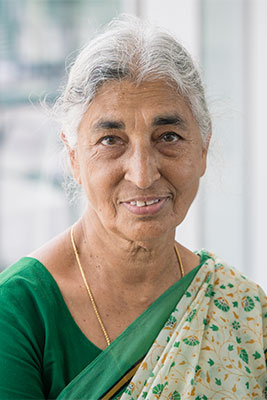Professor (retired)
3131 East Science Hall, Science & Engineering Complex
(205) 975-3674
Research and Teaching Interests: Immunology, Biology of Aging, Evolutionary Medicine
Office Hours: By appointment
Education:
- B.S., Government College for Women, Guntur, India
- M.S., Banaras Hindu University, Banaras, India
- Ph.D., Southern Illinois University, Carbondale, IL
- Postdoctoral, Department of Microbiology, UAB
I am originally from Southern part of India and came to Duke University to study for my Ph.D. in Biochemistry. I was very lonely at Duke and went through a major cultural shock — my English was not fluent and also, because I am a vegetarian, I didn’t know what or where to eat. I transferred to Southern Illinois University and worked with an outstanding scientist and very friendly group of graduate students. I received my Ph.D. in Biochemistry there; my project dealt with organisms and mechanisms responsible for corn stalk rotting.
After completion of my Ph.D., I moved to Birmingham to apply my carbohydrate knowledge to immunoglobulins. My postdoctoral advisor was an accomplished immunologist and an outstanding advisor. Since coming to UAB I have developed several methods to purify antibodies and quantitate cancer burden in mice. I have enjoyed my stay in Birmingham so much so that I never want to leave. Now, after many years of research, I enjoy teaching immunology, the biology of aging, and evolutionary medicine.
-
Research Interests
My specific research interests are in:
- interaction between the immune system and the central nervous system;
- conditioning and mild-to-moderate stress to study interactions between the immune system and the central nervous system, alterations in immune functions, and regulation of cancer/tumor growth; and
- alterations in immune cell populations and functions with age in mice.
To gain knowledge about the above topics, our group has developed methodology to quantitate cancer/tumor burden in mice, determination of response of tumors to chemotherapy, immunotherapy, and combination of the both therapies. We have developed conditioning paradigm for an increase in natural killer cell activity and cytotoxic T-cell activity (immune functions) for cancer treatment therapeutic purposes in mice. We have investigated alterations in immune cells and their activities, following treatment with hormones produced by the thymus. We have measured age associated changes in immune cells and immune functions with age in mice.
